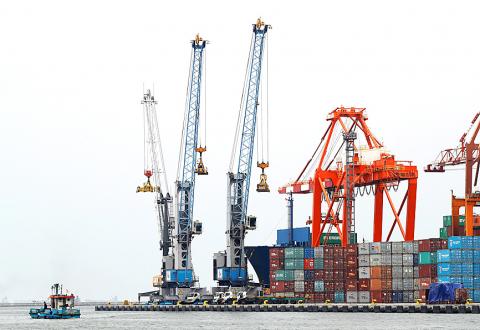Global economic growth should be somewhat softer next year as tighter financial conditions bite.
That is the view of economists at Goldman Sachs Group Inc led by Jan Hatzius, who said that fiscal policy is emerging as a key support for growth as other governments join the US in pulling fiscal levers.
“Looking ahead to 2019, we expect a similar contribution of fiscal stimulus to global growth as in 2018, but the composition shifts from being US-centric to being more broadly based across developing markets and emerging markets,” the analysts wrote in a note.

Photo: Reuters
While that would provide some cushioning for the global economy, it is hard to map out an absolute path for the world’s GDP growth next year.
“An increase in the price of oil, for example, could present a downside risk; and on the upside, continued slack and a long-awaited improvement in productivity could leave economies with more room to grow,” the economists wrote. “That said, our analysis suggests that growth in 2019 should be somewhat softer than it has been in 2018.”
Goldman’s preliminary global current activity indicator last month slipped to 3.7 percent from just above 4 percent mid-year and about 5 percent at the start of this year.
The shift is being led by China, where the economy’s weakest performance since 2009 is set to worsen unless a peace can be struck in the trade war with the US.
Factory readings from Asia already show a fallout, with Taiwan, Thailand and Malaysia slipping into contraction territory.
The eurozone too is losing momentum, expanding in the third quarter at half the pace of the prior three months as Italy and Germany stagnated.
It is a marked turnaround from April, when the IMF said the world was enjoying the most united upswing since 2010.
The mood changed last month when the IMF cut its global outlook for the first time in two years and said growth had plateaued.
There are other signs the peak has passed for the global economy.
IHS Markit’s purchasing managers’ indices (PMIs) for China and the eurozone last month retreated to drive the overall reading to an almost two-year low, while the US gauge was little changed.
Most countries have seen their PMIs decline over the past three months.
“The latest data strongly support the view that the best days in the post-2008 financial crisis growth cycle have been seen,” said Alan Ruskin, global cohead of foreign-exchange research at Deutsche Bank AG.

RECYCLE: Taiwan would aid manufacturers in refining rare earths from discarded appliances, which would fit the nation’s circular economy goals, minister Kung said Taiwan would work with the US and Japan on a proposed cooperation initiative in response to Beijing’s newly announced rare earth export curbs, Minister of Economic Affairs Kung Ming-hsin (龔明鑫) said yesterday. China last week announced new restrictions requiring companies to obtain export licenses if their products contain more than 0.1 percent of Chinese-origin rare earths by value. US Secretary of the Treasury Scott Bessent on Wednesday responded by saying that Beijing was “unreliable” in its rare earths exports, adding that the US would “neither be commanded, nor controlled” by China, several media outlets reported. Japanese Minister of Finance Katsunobu Kato yesterday also

Jensen Huang (黃仁勳), founder and CEO of US-based artificial intelligence chip designer Nvidia Corp and Taiwan Semiconductor Manufacturing Co (TSMC, 台積電) on Friday celebrated the first Nvidia Blackwell wafer produced on US soil. Huang visited TSMC’s advanced wafer fab in the US state of Arizona and joined the Taiwanese chipmaker’s executives to witness the efforts to “build the infrastructure that powers the world’s AI factories, right here in America,” Nvidia said in a statement. At the event, Huang joined Y.L. Wang (王英郎), vice president of operations at TSMC, in signing their names on the Blackwell wafer to

‘DRAMATIC AND POSITIVE’: AI growth would be better than it previously forecast and would stay robust even if the Chinese market became inaccessible for customers, it said Taiwan Semiconductor Manufacturing Co (TSMC, 台積電) yesterday raised its full-year revenue growth outlook after posting record profit for last quarter, despite growing market concern about an artificial intelligence (AI) bubble. The company said it expects revenue to expand about 35 percent year-on-year, driven mainly by faster-than-expected demand for leading-edge chips for AI applications. The world’s biggest contract chipmaker in July projected that revenue this year would expand about 30 percent in US dollar terms. The company also slightly hiked its capital expenditure for this year to US$40 billion to US$42 billion, compared with US$38 billion to US$42 billion it set previously. “AI demand actually

RARE EARTHS: The call between the US Treasury Secretary and his Chinese counterpart came as Washington sought to rally G7 partners in response to China’s export controls China and the US on Saturday agreed to conduct another round of trade negotiations in the coming week, as the world’s two biggest economies seek to avoid another damaging tit-for-tat tariff battle. Beijing last week announced sweeping controls on the critical rare earths industry, prompting US President Donald Trump to threaten 100 percent tariffs on imports from China in retaliation. Trump had also threatened to cancel his expected meeting with Chinese President Xi Jinping (習近平) in South Korea later this month on the sidelines of the APEC summit. In the latest indication of efforts to resolve their dispute, Chinese state media reported that